Guess-the-book meme: answers
So, it's Wednesday, and therefore here are the promised answers to my picks for the guess-the-book meme, complete with some juicy extracts just to liven things up a little:
1) The Crimson Petal and the White by Michel Faber (guessed by a couple of people)
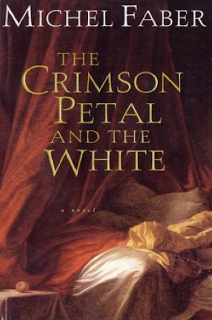
A couple of months ago, my agent and I were talking about negative publicity and whether or not it actually exists, and he asked me if I'd ever bought a book because of a bad review. For some reason, I must have been overtaken by amnesia, because I said that I hadn't because I don't read reviews (good or bad) of fiction. This is the case now (I got bored with the comic potential of other people's outrage), but in fact I actually bought some of my favourite books - including this one - at least partly because some shrieking one-star Amazon reviewer was OMGSHOCKEDANDAPPALLED. If I recall correctly, my already-keen interest in Crimson Petal's blurb was tipped into clicking the 'add to basket' button by a very promising claim that one could not be in favour of women's rights and make it through the book. (What can I say - I don't like being told what I will and won't manage to do.) Not only was that statement spectacularly wrong (and incredibly dense: as anyone who's read the book will know, the most intelligent, likeable, compassionate and complex character in the book is a woman), the book swiftly became one of my all-time favourites; so much so, I haven't had the nerve to watch the recent BBC adaptation of it because I've seen too many lousy adaptations and can't bear to find out if that one's bad, too. It's a huge book and populated by many characters - prostitutes Caroline and Sugar; businessman William Rackham, who sets himself up as Sugar's sole patron; Rackham's 'mad wife in the attic' Agnes and his tragically devout brother Henry; Mrs Fox, the object of Henry's repressed affections - so it's difficult to give a neat summary of the plot, but well worth reading. In these extracts, I think you can see Faber's skill in approaching his role as narrator for this story as something like a tour guide, taking 21st century-dwellers for a walk in the Victorian slums of London:
It's an ashen hour of night, blackish-grey and almost readable like undisturbed pages of burnt manuscript. You blunder forward into the haze of your own spent breath, still following me. The cobblestones beneath your feet are wet and mucky, the air is frigid and smells of sour spirits and slowly dissolving dung. You hear muffled drunken voices from somewhere nearby, but what little you can understand doesn't sound like the carefully chosen opening speeches of a grand romantic drama; instead, you find yourself hoping to God that the voices come no closer.
Church Lane is the sort of street where even the cats are thin and hollow-eyed for want of meat, the sort of street where men who profess to be labourers never seem to labour and so-called washerwomen rarely wash. Do-gooders can do no good here, and are sent on their way with despair in their hearts and shit on their shoes.
2) We Need To Talk About Kevin by Lionel Shriver (guessed by one person)
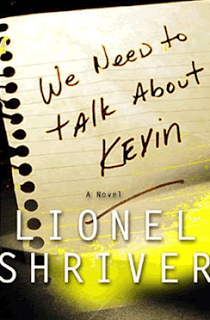
It embarrasses me that I took so long to read this book. I first picked it up just after I finished the first draft of my most recently completed novel - it was one of those always-thought-it-sounded-interesting-but-never-seemed-to-get-around-to-it jobs. Wow. I was missing out. Those who know me know about my raging tocophobia and utter disinterest in children, and after reading this book, there's no way I'd attempt to write a detailed account of why I'm perpetually on the verge of attempting to tie my own tubes with a kitchen knife and a couple of rubber bands, because I could never top Kevin. A story about a successful career woman, Eva, who from the moment she becomes pregnant has misgivings and when her son is born is herself horrified that she feels nothing, who spars with said offspring throughout his childhood and watches his conduct become gradually malign until as a teenager he commits mass murder; what makes this book even more compelling is the obvious parallels between Eva and her son - intelligent, arch, cynical, witty and often cruel, the apple hasn't fallen too far from the tree. Kevin is, essentially, a more extreme version of his mother, which even if (like Eva) I wasn't terrified at the prospect of giving birth and bored by small children, I would find decidedly unsettling. I don't want to know what a more extreme version of me would be like, and I'm glad I don't have to find out. Interestingly, Shriver has often remarked that she finds readers of Kevin tend to fall into two distinct camps: those who think Kevin is a demon seed and his mother never bonded with him because she could sense it, and those who think he became that way because he picked up on Eva's coldness (the classic nature/nurture debate). The book doesn't attempt to answer that question - how can one realistically answer such a question? - but that's another thing I love about it: it acknowledges the complexity and mystery of human minds. For the curious, I lean towards siding with Eva, but I freely admit that in that I am arguably as much of an unreliable witness as she is, because I have so many of the same aversions to the concept of parenthood. Speaking of which, as well as an amusing account of the fantasy of teaching versus the reality, the last sentence of this quote was one of those 'YES!' moments for me; something I've always thought when faced with people who 'love children'. As you can also see from this quote, the book is also (and unexpectedly, perhaps) hilarious:
Miss Fabricant was in no mood for drollery. I felt that in general her early twenties exhilaration at molding all those receptive little moppets into multiculturally aware, environmentally responsible vegetarians driven to rectify inequities in the Third World was beginning to fray around the edges. This was her first year of flaking poster paint from her eyebrows, going to sleep at night with the salty taste of paste in her gums and exiling so many children at a shot for a "time-out" that there was no longer any activity to take a time out from. After all, she had announced at our introduction in September that she "simply loves children," a declaration of which I am eternally dubious. From young women like Miss Fabricant, with a blunt snub of a nose like a Charlotte potato and hips like Idahos, the infeasible assertion seems to decode, "I want to get married." Myself, after having not a child but this particular one, I couldn't see how anyone could claim to love children in the generic any more than anyone could credibly claim to love people in a sufficiently sweeping sense as to embrace Pol Pot, Don Rickles and an upstairs neighbour who does 2,000 jumping jacks at three in the morning.
3) On Chesil Beach by Ian McEwan (not guessed)
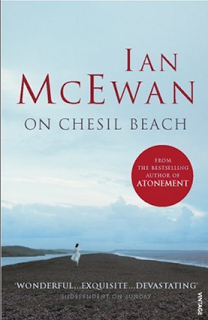
It's a close call, but this just (just) pips Atonement to the post as my favourite Ian McEwan novel. It's a relatively short book, and on the face of it a relatively 'small', insular story: Edward and Florence, a young, virgin couple on their wedding night in 1962; both of whom are nervous, for different reasons, about their forthcoming sexual initiation. I can't really go into too much detail without spoiling the book, but suffice to say that the narrative switches between their respective histories and the story of how they met and got together, and their exchanges in the honeymoon suite; and the reader watches as a combination of Edward and Florence's personality traits, past experiences and socially-enforced misinformation lead things to go spectacularly wrong. The following extracts say a lot about the say-nothing-and-save-face mentality of the times, just before the advent of the contraceptive pill:
While one heard of wealthier people going in for psychoanalysis, it was not yet customary to regard oneself in everyday terms as an enigma, as an exercise in narrative history, or as a problem waiting to be solved.
It is shaming sometimes, how the body will not, or cannot, lie about emotions. Who, for decorum's sake, has ever slowed his heart, or muted a blush?
4) Slammerkin by Emma Donoghue (not guessed)
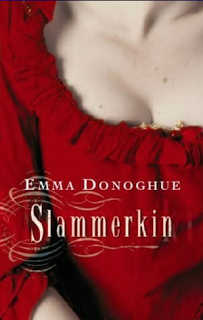
Hmm, the second appearance of historical prostitutes in this list - what's going on here? We're heading into the 18th century this time, though, for a story that is loosely based on historical fact - could only be loosely based on fact, given that all we know of the real Mary Saunders, who is the main character in this story, is that she was a London girl who worked for a time as a prostitute in the capital, before somehow ending up in Monmouth as a dressmaker's apprentice (by the way, a slammerkin was a style of loose dress worn in that period, which also gave rise to the term being used as slang for a 'loose woman'); a dressmaker she went on to be executed for murdering. (That's not a spoiler - it's nothing you won't get from blurbs and the like.) Around that skeletal, impersonal snippet, Donoghue has created an addictive tale of a girl fighting to get more out of life as she struggles to fit into a world which, after all she's seen and done, seems stultifyingly innocent and unworldly. Furthermore, Mary and Doll (the prostitute who takes the homeless teenage Mary under her wing) are a great deal of fun:
'Why did you take me in?' Mary asked her on the walk home that evening. Then she wished she could swallow the words again, because she feared they would make Doll turn cold and scornful, or tell her that her time was long up and she owed a pretty penny, by the way.
But Doll gave a peculiar smile, almost sheepish. 'When I stopped to look at you in the ditch, that morning, I was just curious,' she began. 'I was all set to walk on to the Cheshire Cheese in Fleet Street for my breakfast. But then you bit my hand, and I liked that.'
'You liked it?' asked Mary, bewildered.
'Showed some spirit,' said Doll with satisfaction. 'That's what I'd have done myself.'
5) Angel of Ruin (which goes by the duller title of Fallen Angel in the UK) by Kim Wilkins (not guessed)
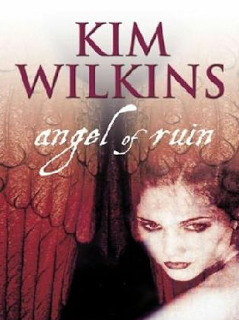
This is my favourite of Kim's books, and one I think would appeal to a lot of writers, being as it ultimately is about the power of storytelling, and the alarming compulsion one can feel to tell a tale. Like much of her work, it's a timeslip piece, alternating between modern-day journalist Sophie, who's looking for occult-themed stories to sell to Halloween issues of magazines, and Restoration-era London, with the three daughters of the poet John Milton, whose sisterly relationships are wonderfully drawn. It's a supernatural fantasy, too (I don't think the Miltons actually had a fallen angel living in their house), so that adds another element to the book; making the magic of storytelling quite literal:
'Look, this may sound a little strange,' I said, 'but an acquaintance of mine told me about you. She said you had an interesting story to tell.'
'I do.'
'I'm a journalist. I collect interesting stories.'
'I'm happy to tell you my story, but it may be dangerous for you to hear it.'
'Yes, yes, so I've heard. I'm afraid I don't hold much with such superstitions.'
'Even so, I have cautioned you.'
So yes, I recommend all of those - check 'em out, if you're thus inclined!
1) The Crimson Petal and the White by Michel Faber (guessed by a couple of people)

A couple of months ago, my agent and I were talking about negative publicity and whether or not it actually exists, and he asked me if I'd ever bought a book because of a bad review. For some reason, I must have been overtaken by amnesia, because I said that I hadn't because I don't read reviews (good or bad) of fiction. This is the case now (I got bored with the comic potential of other people's outrage), but in fact I actually bought some of my favourite books - including this one - at least partly because some shrieking one-star Amazon reviewer was OMGSHOCKEDANDAPPALLED. If I recall correctly, my already-keen interest in Crimson Petal's blurb was tipped into clicking the 'add to basket' button by a very promising claim that one could not be in favour of women's rights and make it through the book. (What can I say - I don't like being told what I will and won't manage to do.) Not only was that statement spectacularly wrong (and incredibly dense: as anyone who's read the book will know, the most intelligent, likeable, compassionate and complex character in the book is a woman), the book swiftly became one of my all-time favourites; so much so, I haven't had the nerve to watch the recent BBC adaptation of it because I've seen too many lousy adaptations and can't bear to find out if that one's bad, too. It's a huge book and populated by many characters - prostitutes Caroline and Sugar; businessman William Rackham, who sets himself up as Sugar's sole patron; Rackham's 'mad wife in the attic' Agnes and his tragically devout brother Henry; Mrs Fox, the object of Henry's repressed affections - so it's difficult to give a neat summary of the plot, but well worth reading. In these extracts, I think you can see Faber's skill in approaching his role as narrator for this story as something like a tour guide, taking 21st century-dwellers for a walk in the Victorian slums of London:
It's an ashen hour of night, blackish-grey and almost readable like undisturbed pages of burnt manuscript. You blunder forward into the haze of your own spent breath, still following me. The cobblestones beneath your feet are wet and mucky, the air is frigid and smells of sour spirits and slowly dissolving dung. You hear muffled drunken voices from somewhere nearby, but what little you can understand doesn't sound like the carefully chosen opening speeches of a grand romantic drama; instead, you find yourself hoping to God that the voices come no closer.
Church Lane is the sort of street where even the cats are thin and hollow-eyed for want of meat, the sort of street where men who profess to be labourers never seem to labour and so-called washerwomen rarely wash. Do-gooders can do no good here, and are sent on their way with despair in their hearts and shit on their shoes.
2) We Need To Talk About Kevin by Lionel Shriver (guessed by one person)

It embarrasses me that I took so long to read this book. I first picked it up just after I finished the first draft of my most recently completed novel - it was one of those always-thought-it-sounded-interesting-but-never-seemed-to-get-around-to-it jobs. Wow. I was missing out. Those who know me know about my raging tocophobia and utter disinterest in children, and after reading this book, there's no way I'd attempt to write a detailed account of why I'm perpetually on the verge of attempting to tie my own tubes with a kitchen knife and a couple of rubber bands, because I could never top Kevin. A story about a successful career woman, Eva, who from the moment she becomes pregnant has misgivings and when her son is born is herself horrified that she feels nothing, who spars with said offspring throughout his childhood and watches his conduct become gradually malign until as a teenager he commits mass murder; what makes this book even more compelling is the obvious parallels between Eva and her son - intelligent, arch, cynical, witty and often cruel, the apple hasn't fallen too far from the tree. Kevin is, essentially, a more extreme version of his mother, which even if (like Eva) I wasn't terrified at the prospect of giving birth and bored by small children, I would find decidedly unsettling. I don't want to know what a more extreme version of me would be like, and I'm glad I don't have to find out. Interestingly, Shriver has often remarked that she finds readers of Kevin tend to fall into two distinct camps: those who think Kevin is a demon seed and his mother never bonded with him because she could sense it, and those who think he became that way because he picked up on Eva's coldness (the classic nature/nurture debate). The book doesn't attempt to answer that question - how can one realistically answer such a question? - but that's another thing I love about it: it acknowledges the complexity and mystery of human minds. For the curious, I lean towards siding with Eva, but I freely admit that in that I am arguably as much of an unreliable witness as she is, because I have so many of the same aversions to the concept of parenthood. Speaking of which, as well as an amusing account of the fantasy of teaching versus the reality, the last sentence of this quote was one of those 'YES!' moments for me; something I've always thought when faced with people who 'love children'. As you can also see from this quote, the book is also (and unexpectedly, perhaps) hilarious:
Miss Fabricant was in no mood for drollery. I felt that in general her early twenties exhilaration at molding all those receptive little moppets into multiculturally aware, environmentally responsible vegetarians driven to rectify inequities in the Third World was beginning to fray around the edges. This was her first year of flaking poster paint from her eyebrows, going to sleep at night with the salty taste of paste in her gums and exiling so many children at a shot for a "time-out" that there was no longer any activity to take a time out from. After all, she had announced at our introduction in September that she "simply loves children," a declaration of which I am eternally dubious. From young women like Miss Fabricant, with a blunt snub of a nose like a Charlotte potato and hips like Idahos, the infeasible assertion seems to decode, "I want to get married." Myself, after having not a child but this particular one, I couldn't see how anyone could claim to love children in the generic any more than anyone could credibly claim to love people in a sufficiently sweeping sense as to embrace Pol Pot, Don Rickles and an upstairs neighbour who does 2,000 jumping jacks at three in the morning.
3) On Chesil Beach by Ian McEwan (not guessed)

It's a close call, but this just (just) pips Atonement to the post as my favourite Ian McEwan novel. It's a relatively short book, and on the face of it a relatively 'small', insular story: Edward and Florence, a young, virgin couple on their wedding night in 1962; both of whom are nervous, for different reasons, about their forthcoming sexual initiation. I can't really go into too much detail without spoiling the book, but suffice to say that the narrative switches between their respective histories and the story of how they met and got together, and their exchanges in the honeymoon suite; and the reader watches as a combination of Edward and Florence's personality traits, past experiences and socially-enforced misinformation lead things to go spectacularly wrong. The following extracts say a lot about the say-nothing-and-save-face mentality of the times, just before the advent of the contraceptive pill:
While one heard of wealthier people going in for psychoanalysis, it was not yet customary to regard oneself in everyday terms as an enigma, as an exercise in narrative history, or as a problem waiting to be solved.
It is shaming sometimes, how the body will not, or cannot, lie about emotions. Who, for decorum's sake, has ever slowed his heart, or muted a blush?
4) Slammerkin by Emma Donoghue (not guessed)

Hmm, the second appearance of historical prostitutes in this list - what's going on here? We're heading into the 18th century this time, though, for a story that is loosely based on historical fact - could only be loosely based on fact, given that all we know of the real Mary Saunders, who is the main character in this story, is that she was a London girl who worked for a time as a prostitute in the capital, before somehow ending up in Monmouth as a dressmaker's apprentice (by the way, a slammerkin was a style of loose dress worn in that period, which also gave rise to the term being used as slang for a 'loose woman'); a dressmaker she went on to be executed for murdering. (That's not a spoiler - it's nothing you won't get from blurbs and the like.) Around that skeletal, impersonal snippet, Donoghue has created an addictive tale of a girl fighting to get more out of life as she struggles to fit into a world which, after all she's seen and done, seems stultifyingly innocent and unworldly. Furthermore, Mary and Doll (the prostitute who takes the homeless teenage Mary under her wing) are a great deal of fun:
'Why did you take me in?' Mary asked her on the walk home that evening. Then she wished she could swallow the words again, because she feared they would make Doll turn cold and scornful, or tell her that her time was long up and she owed a pretty penny, by the way.
But Doll gave a peculiar smile, almost sheepish. 'When I stopped to look at you in the ditch, that morning, I was just curious,' she began. 'I was all set to walk on to the Cheshire Cheese in Fleet Street for my breakfast. But then you bit my hand, and I liked that.'
'You liked it?' asked Mary, bewildered.
'Showed some spirit,' said Doll with satisfaction. 'That's what I'd have done myself.'
5) Angel of Ruin (which goes by the duller title of Fallen Angel in the UK) by Kim Wilkins (not guessed)

This is my favourite of Kim's books, and one I think would appeal to a lot of writers, being as it ultimately is about the power of storytelling, and the alarming compulsion one can feel to tell a tale. Like much of her work, it's a timeslip piece, alternating between modern-day journalist Sophie, who's looking for occult-themed stories to sell to Halloween issues of magazines, and Restoration-era London, with the three daughters of the poet John Milton, whose sisterly relationships are wonderfully drawn. It's a supernatural fantasy, too (I don't think the Miltons actually had a fallen angel living in their house), so that adds another element to the book; making the magic of storytelling quite literal:
'Look, this may sound a little strange,' I said, 'but an acquaintance of mine told me about you. She said you had an interesting story to tell.'
'I do.'
'I'm a journalist. I collect interesting stories.'
'I'm happy to tell you my story, but it may be dangerous for you to hear it.'
'Yes, yes, so I've heard. I'm afraid I don't hold much with such superstitions.'
'Even so, I have cautioned you.'
So yes, I recommend all of those - check 'em out, if you're thus inclined!
Published on May 25, 2011 10:48
No comments have been added yet.
Faye L. Booth's Blog
- Faye L. Booth's profile
- 10 followers
Faye L. Booth isn't a Goodreads Author
(yet),
but they
do have a blog,
so here are some recent posts imported from
their feed.



